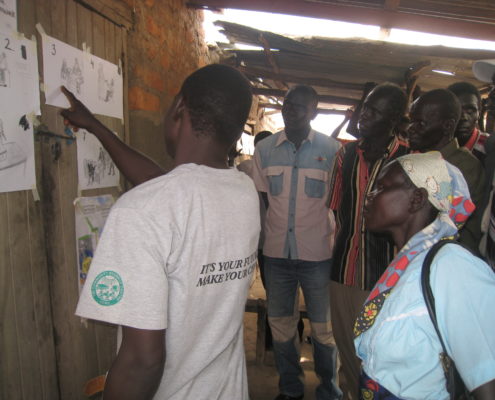

2. Access to information component
Here, we focus on ensuring that relevant public information (laws, plans and budgets) which facilitates full and meaningful participation and dialogue is made available and accessible to all stakeholders when it is needed.
The aim here is to provide access to relevant public information by local government duty bearers and community members to participate actively in, and influence public decision making. This is achieved by;
- Providing an environment for accessing and sharing public information,
- Establishing a single data exchange medium for continuous sharing of credible information between Government and Local community,
- Conducting awareness on key legislations for informed dialogue and advocacy.

3. Poverty reduction
We equally support government efforts to drive rural economic recovery and development, by providing skills that will stimulate entrepreneurship initiatives. This will enable the poor to participate in promoting good governance and to benefit from the growth process. It also enables the poor to engage in income generating activities for self reliance.
This is aimed at building community skills and potentials for self reliance and sustainable development. This is done by;
- Providing young men and women with vocational skills capacities,
- Supporting communities with communal micro capital savings and training,
- Equipping youth with entrepreneurial skills
4. Conflict management and peace building.
CEDED put more emphasis on contextual analysis and ability to identify local capacities for peace building based on unintentional conflict generation and avoids re-fueling latent conflict.
This is aimed at reinforcing conflict mitigation and peace building efforts for sustainable peace and stability in South Sudan. This is done through;
- Development of innovative, outcome oriented approaches and strategies for peace building in key sectors,
- Mitigation of chronic conflict amongst the communities of South Sudan,
- Initiation of conflict management and peace maintenance schemes in South Sudan
- Undertaking of policy directed research to provide timely inputs and recommendations to key stakeholders on specific peace building issues.
5. Civic education in schools.
Students are future leaders and direct heir to the country’s leadership. They are also rights holders with opportunities for learning. This component combines non-formal and formal civic education support.
We empower students with necessary democratic governance skills so that they grow into responsibilities – having the capabilities to recognize their rights, the authority and legitimacy to claim their rights and the resources to claim and access those rights prevents discrimination against and that they have the ability to participate and to hold the duty bearers accountable.
This is aimed at effectively engaging school learners to participate in local democracy and good governance practice in their schools. This is achieved by;
- Ensuring that learners are accountable of democratic principles and general human rights,
- Encouraging equal gender participation in building local democracy,
- Empower school learners so that they are involve effectively in the issues affecting their community.

